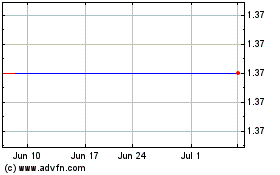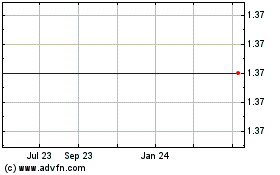CBS Corp. (CBS) Chief Executive Les Moonves said Wednesday that
advertising sales negotiations in advance of the fall programming
season are well underway and the numbers are coming in where he
wanted them.
"A lot of deals are going to be done this week," said Moonves at
an investor conference in New York City. "It's a very strong
marketplace."
Meanwhile, Moonves is also focused on the subscription side of
the business as the rise of the Internet disrupts the traditional
economics of media and raises questions about how companies like
CBS will monetize their content on the web.
"We're only getting pennies on the dollar for online at this
point," said Moonves about the company's experiments in
ad-supported web video offerings.
Moonves said he supports "TV Everywhere," the pay-TV industry's
efforts to move its subscription model online through a web
authentication system that would only allow access to programming
to users who can confirm their TV service subscription with a
distributor like cable or satellite providers.
As the focus on subscription models grows along with online
video, broadcast TV network owners are seeking subscription fees
from distributors--known as retansmission or retrans fees--that are
more in line with those received by their cable network
counterparts. For his part, Moonves has long said he expects CBS to
receive $250 million annually in retrans fees by 2012.
On Wednesday, Moonves said he now thinks that figure may be
conservative, and it doesn't include retrans fees that may be paid
to CBS by its affiliates in return for its programming.
Moonves was an early proponent of retrans fees in the industry
after CBS was separated from Viacom Inc. (VIA), which owns a stable
of popular cable networks. Many media conglomerates historically
have received compensation for their broadcast programming through
the subscriber fees paid for their cable networks, but CBS lost
that leverage in the separation, becoming more of a pure-play
broadcaster.
More recently, companies that own both cable networks and a
major broadcast network, like The Walt Disney Co. (DIS), which owns
ABC, and News Corp. (NWS, NWSA), which owns Fox, have become more
vocal about receiving retrans fees as their ad businesses have
lagged.
"ABC has been very proactive," said Moonves. "So has Fox, and
Comcast Corp. (CMCSA) even went out and bought a network," he said,
referring to Comcast's deal to take a majority stake in NBC
Universal.
Moonves said broadcasters deserve a larger piece of the
subscription pie, since broadcast programming commands the largest
TV audiences and broadcasters pay large amounts of money for the
rights to the most popular, live TV programming, like sports.
He said distributors, which have resisted paying retrans fees,
will ultimately get the money to pay these fees from cable networks
that are overcompensated for their small audiences.
"Our distributors are smart, and they're going to ensure that
people get what they want to watch," said Moonves. "I don't think
they plan on passing it on to consumers. Nor will they cut their
profits. I don't think we'll see that anytime soon."
He noted that the average U.S. household has access to 150
channels but only watches 12 to 15 of them--a statistic that if
often pointed out by proponents of so-called a la carte
programming, which would allow consumers to pay for only the
networks they want, without buying the traditional programming
bundle that has long been the mainstay of the industry's pricing
model.
Moonves said he doesn't support a la carte pricing for TV. Also,
he said he doesn't think regulators and lawmakers will get involved
in negotiations between TV content providers and distributors.
On Apple Inc.'s (AAPL) iPad, Moonves said CBS hasn't reached an
agreement with Apple to make its programming available on the
device, but he said the company is willing to experiment with any
distribution model that offers an attractive pricing for its
content.
Moonves said he's not sure whether consumers dropping their
pay-TV subscription to use only online media--a phenomenon known as
cord-cutting--is a real threat to the TV industry.
"I'm not a believer that cord-cutting becomes a major player,
but I'm certainly not ignoring it," he said.
Moonves said there are no discussions at CBS about going
private, although several media companies recently have announced
go-private transactions, like Mediacom Communications Inc. (MCCC)
and Emmis Communications Corp. (EMMS).
"Sumner Redstone likes owning public companies, and that's his
call," said Moonves, referring to the controlling shareholder of
CBS and Viacom.
Moonves said CBS still may be interested in divesting radio
stations and possibly some TV stations in smaller markets, but he
said the company also could possibly consider acquiring TV stations
in larger markets if they became available.
"Maybe some NBC stations? Just kidding," said Moonves. He said
Comcast's deal for NBCU isn't a threat to CBS, and he expects
Comcast's top executives to do a good job managing the media
conglomerate.
-By Nat Worden, Dow Jones Newswires; 212-416-2472;
nat.worden@dowjones.com
Emmis Communications (NASDAQ:EMMS)
Historical Stock Chart
From Mar 2024 to Apr 2024

Emmis Communications (NASDAQ:EMMS)
Historical Stock Chart
From Apr 2023 to Apr 2024
